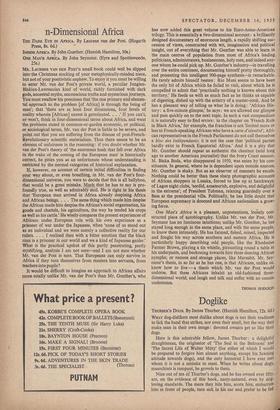n-Dimensional Africa
INSIDE AFRICA. By John Gunther. (Hamish Hamilton, 30s.) MR. LAURENS VAN DER POST'S small book could well be slipped into the Christmas stocking of your metaphysically-minded niece, but not of your positivistic nephew. To enjoy it you must be willing to enter Mr. van der Post's private world, a peculiar Jungian- Blakian-Lawrencian kind of world, richly furnished with dark gods, ancestral myths, unconscious truths and mysterious journeys. You must swallow his premisses that 'the one primary and elemen- tal approach to the problem [of Africa] is through the being of man'; that 'there are at least four dimensions, four levels of reality wherein [African] unrest is germinated. . . If you can't, or won't, think in four-dimensional terms about Africa, and want the problems stated in common-or-garden economic, or political, or sociological terms, Mr. van der Post is liable to be severe, and point out that you are suffering from the disease of post-French- Revolutionary scientific materialism. Thus there seems to be an element of unfairness in the reasoning: if you doubt whether Mr. van der Post's theory of 'the enormous hush that fell over Africa in the wake of the coming of the European man' is historically correct, he pities you as an unfortunate whose understanding is restricted by the normal categories of historical explanation.
If, however, on account of certain initial difficulties in finding your way about, or even breathing, in Mr. van der Post's four- dimensional universe, you were to decide that this is all ballyhoo, that would be a great mistake. Much that he has to say is pro- foundly true, as well as admirably said. He is right in his thesis that 'European man arrived in Africa already despising Africa and African beings. . . . The same thing which made him despise the African made him despise the African's social organisation, his goods and chattels, his agriculture, the way he tended his crops as well as his cattle.' He wisely compares the present experiences of Africans under European rule with his own experience as a prisoner of war under the Japanese, when 'none of us stood out as an individual and we were merely a collective reality for our rulers. . . . I realised then with a bitter emotion that the black man is a prisoner in our world and we a kind of Japanese gaoler.' What is the practical upshot of this partly penetrating, partly mystifying, analysis I am not sure—and I am not sure whether Mr. van der Post is sure. That Europeans can only survive in Africa if they turn themselves from masters into servants, from teachers into pupils?
It would be difficult to imagine an approach to African affairs more totally unlike Mr. van der Post's than Mr. Gunther's, who has now added this great volume to his Euro-Asian-Americat trilogy. This is essentially a two-dimensional account: a brilliant13 designed documentary of enormous length, a rapidly shifting suc cession of views, constructed with wit, imagination and politica insight, out of everything that Mr. Gunther was able to learn it the main centres of population from most of Africa's leadint politicians, administrators, businessmen, holy men, and indeed any one whom he could pick up. Mr. Gunther's industry—in travellini over the entire continent, documenting himself pretty thoroughly and presenting this intelligent 900-page synthesis—is remarkable He rarely admits himself beaten : Rio Muni seems to have beer the only bit of Africa which he failed to visit, about which he compelled to admit that 'practically nothing is known about thi: territory.' He feeds us with as much fact as he thinks us capable of digesting, dished up with the artistry of a master-cook. And he has a pleasant way of telling us what he is doing: 'African His• tory : a five-minute glimpse,' he says : we are allowed our glimpse and pass quickly on to the next topic. In such a vast compendiurr it is naturally easy to find errors : in the chapter on 'French Rule in Black Africa,' for example, the franchise is not 'limited more of less to French-speaking Africans who have a carte d'identite; Afri• can representatives in the French Parliament do not call themselve! a bloc des Independants; it is not the case that 'political partie! hardly exist in French Equatorial Africa.' And it is a pity that Mr. Gunther should repeat as authentic the chestnut (sold long ago to another American journalist) that the Ivory Coast senator M. Biaka Boda, who disappeared in 1950, was eaten by his con• stituents. In general, where he is dependent upon outside sources Mr. Gunther is shaky. But as an observer of manners he excels Nothing could be better than these sharp photographic account! of African shoppers in Lusaka, forced to line up at hatchways; of Lagos night clubs, 'sordid, amateurish, explosive, and delightful in the extreme'; of President Tubman, relaxing guardedly over a Bass at the presidential villa. Politically, he has little doubt that European supremacy is doomed and African nationalism a grow- ing force.
One Man's Africa is a pleasant, unpretentious, loOsely con. structed piece of autobiography. Unlike Mr. van der Post, Mr. Seymour has no luminous intuitions; unlike Mr. Gunther, he has stayed long enough in the same place, and with the same people, to know them intimately. He has farmed, fished, mined, inspected and fought his way across southern and eastern Africa. He is particularly happy describing odd people, like the Rhodesian Farmer Brown, playing a tin whistle, pirouetting round a table in his underpants, and beckoning towards him three dancing African nymphs; or remote and strange places, like Marsabit. Mr. Sey- mour's thesis, in so far as he has one, is that Africans, unlike us, know how to live — a thesis which Mr. van der Post would endorse. But these Africans inhabit an old-fashioned three- dimensional world; and laugh and talk and suffer with no cosmic undertones.
THOMAS HODGKIN


































 Previous page
Previous page